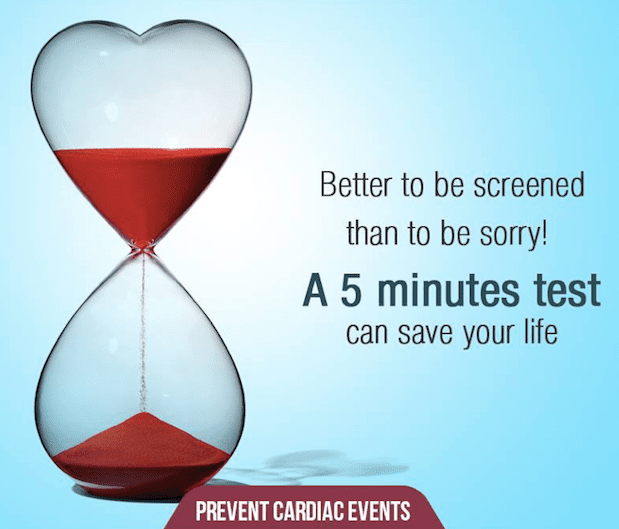
5 Mins Cardiovascular Test/Arterial Stiffness Index Analysis Test to detect Heart disease and stress level.
For many people, their first cardiovascular symptom is a heart attack or stroke. This is due to the fact that you cannot feel your arteries stiffen.
Now we can easily screen for the precursors to Heart Disease and other cardiovascular issues with an FDA approved, non-invasive 5-minute test as a vital part of Preventive Care.
This test uses an Infra-Red Sensor, attached to a machine, will analyze the pulse waves from the capillaries at the fingertip and using a special algorithm gives us information about the nature of the artery wall, the probable level of block inside the vessel, heart rate variability, nature of the Autonomic nervous system, arrhythmias and also the possible future risk factors.
Early detection of arterial wall stiffness, Biological age of arteries, Information regarding the efficacy of treatment choices and a tool to monitor the arterial wall response to lifestyle changes/reduction of cardiovascular risk factors.
5 Mins Cardiovascular Status Analysis Test
5 Mins Cardiovascular Status Analysis Test
Arterial Waveform Analysis, holds the promise of detecting vascular disease at the earliest stages when subtle changes in the arterial wall provide what appears to be an early marker for vascular disease.
Arterial waveform analysis has the potential to assist physicians in positively identifying individuals who exhibit the development of vascular disease and begin appropriate treatment – long before symptoms or clinical signs appear.
Arterial waveform analysis may also help physicians improve management of the pharmacological therapy for their patients and aid in efforts to better utilize healthcare resources by allowing therapy to begin much earlier in the disease process when lifestyle changes and/or lower-cost treatments are most beneficial.
Heart Rate Variability, or HRV, is a measurement of the interaction between the sympathetic (“fight or flight”) nervous system and the parasympathetic (“relaxation”) nervous system in the overall autonomic nervous system.
HRV reflects the heart’s ability to adapt to changing circumstances by detecting and quickly responding to unpredictable stimuli. It measures theoverall health and well-being and reflects on how the body adapts to perform at maximum efficiency.
Decreased HRV implies a decreased ability to respond to changes in the environment. Too much consistency in heart rate (less variability) is often associated with dysfunction and disease as well as a higher mortality rate in both healthy and unhealthy subjects.
Thus it can be shown to be a strong predicator of all-cause mortality. The heart is not just a simple pump, but a complex sensory organ with its own functional “heart brain” that communicates with and influences the brain via the nervous system, hormonal system and other pathways.
Research has shown that these influences profoundly affect brain function and most of the body’s major organs. Science now confirms that stress significantly increases the risk of heart disease, including sudden cardiac death.
Unmanaged emotional stress is equally if not more important than physical variables in determining health outcomes. A conservative estimate is that 75% of visits to primary care physicians are due to stress-related disorders.
A number of studies have demonstrated that patients with anxiety, phobias and post-traumatic stress disorder (PSTD) consistently show lower HRV, even when not exposed to a trauma-related prompt. Importantly, this relationship existed independent of age, gender, trait anxiety, cardio-respiratory fitness, heart rate, blood pressure and respiration rate.
FAQ
To schedule for Diagnostic Tests, fill in your details on the form and submit it Or call us on the number given in the form.

